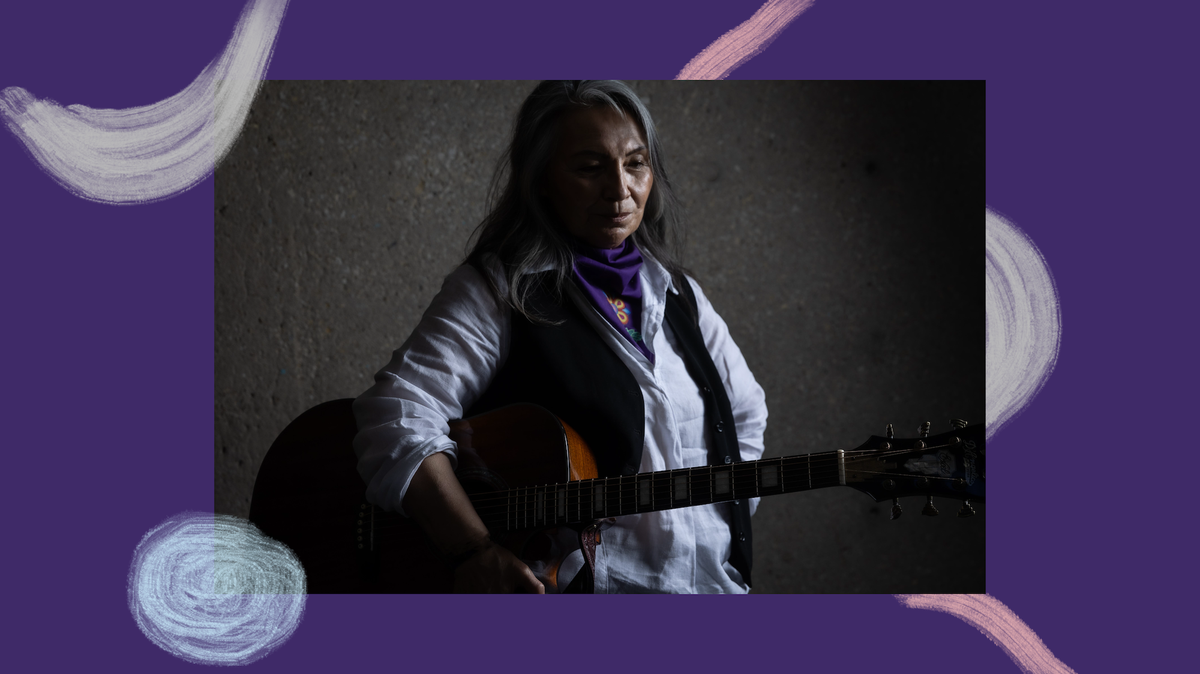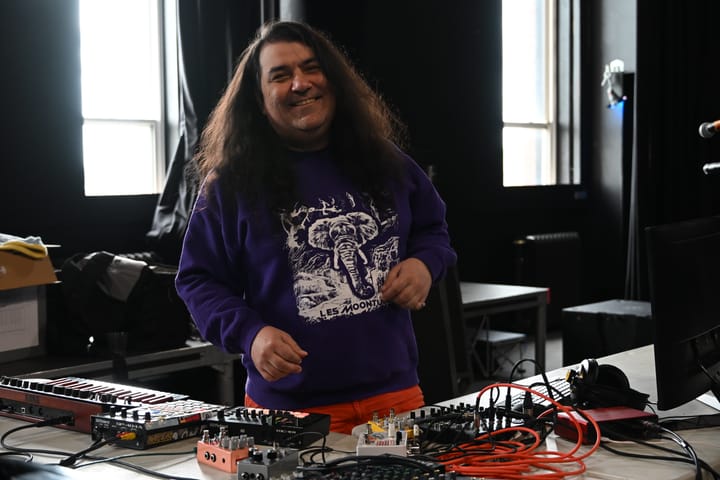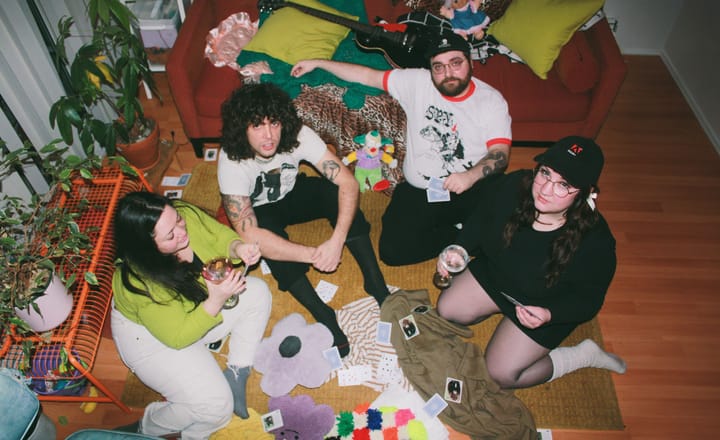
Keep Moving Forward: In Conversation with Phyllis Sinclair
The music career of Edmonton-based singer-songwriter Phyllis Sinclair (Kawéchiwásik / York Landing First Nation) spans over two decades. 15 years after her debut record came out, Sinclair released her most acclaimed release to date, 2021’s Ghost Bones, which earned her a Canadian Folk Music Award nomination and reached #1 on Earshot’s Canadian National Folk/Roots/Blues Chart. It’s a feat to work in any field that long let alone one that feels as particularly gruelling as the music industry.
Sinclair’s new album, her sixth, is entitled Kiyam, a Cree word loosely translated to “let it be.” It’s a folk album filled with encouraging lyrics and narratives, which much like Sinclair’s own story, centre on perseverance. When I ask Sinclair over the phone what continues to drive her, she tells me a story:
In the early 2000s in the North End of Winnipeg, Sinclair’s cousin suddenly passed away. At the funeral, Sinclair recalls that so many people came to pay their respects that the audience overflowed onto the sidewalk outside of the funeral home. Attendees spoke about how caring Sinclair’s cousin was and told story after story of her selfless acts despite her own struggles experiencing homelessness. It’s bringing stories like these to light that keeps Sinclair going.
“There are so many people like her that people don't know about because they don't hear about it,” says Sinclair whose ode to her cousin, “Hard-Time Hannah,” appears on her debut album Fence Posts and Stones (2006). “So often what we hear on the news has so much negativity and I thought, people have to know about the beauty of the [Cree] culture and the people. That's what set my feet on this path and I think I continue to do that. Even though my focus might shift a little bit, that’s always the underlying reason for doing what I do.”
On her website, Sinclair includes an overview on her early life where she recounts growing up in Churchill, Manitoba, being out on the land, and the traditional ways of being taught to her by her grandmother and mother. But racism and the impacts of colonization are also present too: many of Sinclair’s friends and relatives were forced to go to residential school while Sinclair was spared only because her grandfather lost his Status— a designation regulated by the federal government that grants certain rights to its registrants— after enlisting in the army.
Whether it was the hymns at the church services she attended with her grandmother or the songs people would sing at get-togethers at home, Sinclair was moved by music from a young age. After her family eventually relocated to Winnipeg, Sinclair learned three guitar chords that would change her life.
“I was a young teen in the early ‘70s and the hippie movement was moving north to Winnipeg so there were a lot of people sitting in parks, playing music, and all those kinds of free-spirited things. From that arose different coffee houses where many of these people would just sit and play music,” she recalls. “I was really attracted to the music of Cat Stevens, James Taylor, Joni Mitchell, those kinds of people, and this was the kind of music that I would be hearing around and I wanted to learn how to play it. So somebody taught me three chords, D, A, and G, and I figured out that I could learn a couple of songs from there. I found that just having those three little chords was like a godsend to me.”
With a guitar in hand, writing her own songs was a natural next step for Sinclair who had always found writing to be a helpful way to process the world around her. “I really wanted to take words and music, put it together, and bring people inside the world that I knew, the people that I knew, and the places that meant something to me so I began to put that to pen,” Sinclair says about the transition between covering songs and writing her own.
Following Fence Posts and Stones, Sinclair released three more records: Fathomless Tales from Leviathan’s Hole (2011), a Christmas album Wishlist (2014), and Dreams of the Washerwomen (2016). Along the way she also earned her MBA and worked in various capacities at the CBC.
But Ghost Bones was the record Sinclair always imagined making. In previous records, Sinclair felt that she held back when it came to her lyrics and tailored the style of her songs so they would receive more radio play. While battling an illness that left her with low energy, Sinclair was unable to write any new songs for a few years. But as she explains that period gave her time to reflect on her approach to her craft:
“I said to myself, ‘Okay Phyllis, what is it that you want to say that you haven't said yet? Time goes on, you're not going to be young forever and before you leave this place what is it that you want to say? What mark do you want to make?’ Illness will make you think about what's really important to you, because you realize just how fragile life is,” she says.
After recovering, Sinclair wrote Ghost Bones with a newfound courage to confront difficult subjects. The haunting “Unforgotten Lullaby,” for instance, centres on the Missing and Murdered Indigenous Women, Girls, and Two-Spirit peoples. The fact that Sinclair’s most authentic release garnered so much attention left her feeling stronger than ever. “My only hope at that time was that people would be ready and receptive and I'm very grateful that they were,” she notes.
In response to the heaviness of Ghost Bones, Sinclair set out to make her next album more encouraging. While the brightly sounding Kiyam doesn’t shy away from harsh realities, Sinclair always returns to positivity. Sinclair summarizes this optimistic tone the best on the standout track “Monsters” when she sings, “Darkness is just daylight’s silhouette.”
“Life is not easy, we all have these hard roads and we all have these different things that we have to contend with on a day-to-day basis,” Sinclair says. “Kiyam is my way of saying that it’s okay to have hard times but we have everything we need inside of us to keep moving forward despite the challenges that we face. Life is hard but it’s all there, it’s all within us.”
After my conversation with Sinclair, I returned to Kiyam. Like with every listen of the album, a different lyric struck me. On “Tough Girl” Sinclair sings, “It means that I’ll walk my given path, by the ancient ones who only ask that I live to tell my story.” Sinclair’s sense of purpose can always be found driving her songs.
“I've been in it for over 20 years and there are times when I still have to stop and ask, ‘Why are you doing this? What drives you? Is it really worth it?’ And I think those questions are valid and that we do have to ask those questions from time to time. But on the other hand, I consider musicians as artists and I've never heard a painter say, ‘I'm putting my paintbrush down because I'm eighty.’ I think you carry on because you enjoy the process.”
Read more

Sentries: Multifaceted Noise Rock

Step Into Little Stone Crow's World

